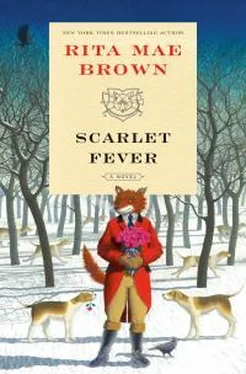“Morris, it’s Betty Franklin, your old dancing partner.”
“Betty? Betty?” He struggled to place her but didn’t shrink away.
“Come on. Let’s get you into the house.” Sister gently guided him, holding on to his right arm while Betty had his left, toward Cindy’s house.
People threw blankets on their horses. Weevil, having pulled his work coat out of the hound truck, and Gray, Sister’s partner in life, were already fixing up a temporary fence to keep in Clytemnestra and Orestes for tomorrow, when they would be put out to pasture.
Weevil asked no questions as they worked.
Gray volunteered, “A former hunt club member. Morris Taylor.”
“Drew Taylor’s family?”
“Brother. Senile dementia. He must have found or stolen the car keys. He’s pretty far gone.”
Weevil, hammer in hand, drove a nail into the makeshift board. “Hope this holds.”
“Let’s get another one plus one of her old barrels for a barrier. You never know about that damned cow,” Gray grumbled.
As Sister and Betty walked the crying man to the welcoming house, Sister thought to herself, “There but for the grace of God.”
Perhaps.
In the house, having endured the cold for two and a half hours, Sister wrapped her hands around a cup of hot chocolate, glad for the warmth. Today the cold seeped into her bones. Seemed to affect the others the same way. The members sipped tea, coffee, and hot chocolate and a few braced themselves with strong spirits.
A knock on the door sent Cindy to open it.
“I am so sorry to keep you waiting,” Drew Taylor apologized.
“No matter, come on. Morris is over there with Betty and Weevil, whom he met today. Chattering away.”
Having completed the temporary fence repairs, Weevil and Gray were now inside.
“Had a devil of a time getting a client out the door.” Drew blew air out of his nostrils, looked at his brother, sighed. “How much damage is there?”
Cindy released a deep throaty laugh, one that sent men into a transport. “A few fence panels. Don’t worry about it. I fear, however, your Range Rover will need to be towed. All the way to Richmond, unfortunately.”
He smiled, as he’d always liked Cindy, had done so for decades. “I should never have kept that car.”
“You look important driving it.”
“Why Rover doesn’t open a dealership in Charlottesville I will never know. It’s a pain in the ass.”
She placed her hand on his forearm. “Morris cried quite a bit. He’s afraid you’ll be angry at him.”
Now noticing his brother, Morris became fearful. “I didn’t mean to do it.”
Betty stood up but Drew motioned for her to stay seated. Morris now clung to her hand so she was pulled down.
“It’s all right, buddy, but where did you find the keys?” Drew lifted an eyebrow.
Defiantly, his younger brother said, “I’m not telling. You can’t make me tell.”
People looked then looked away, except for Harry Dunbar, who stared for a minute, shook his head, then averted his eyes.
“Lower your voice, Morris,” Drew ordered.
Again a fearful look crossed the not-unattractive suffering man’s face.
Sister walked over. “Drew, glad you got here. Missed you during the hunt, which had some good moments.”
“And some cold ones.” He smiled. “I’ll be out Saturday.” He looked down at Morris. “Maybe I can find someone to drive him in our old truck. You know, so he can be part of things.”
“That’s a good idea,” Sister agreed. “Morris has always been social and it’s not too different now. He seems to remember some of us but not our names. If I say my name he nods.”
“There are days and then there are days.” He put his hand under his brother’s armpit. “Come on. I’m taking you home.”
Morris shrugged him off. “I don’t want to go home. There are no women at home.”
Betty couldn’t help it. She burst out laughing.
“Come on.”
“I’m not going,” Morris refused.
“You know, Morris, you have a point. No women. Men need women.” Betty smiled at him. “How about if I walk you with Drew and we figure out how to get some girls to the house.”
Morris brightened. “I like to talk to women. I like to look at them. I like breasts.”
“Oh God.” Drew moaned.
Sister shrugged. “It’s all right. He says what everyone else is thinking.”
Drew looked around at the small group, noticing Harry Dunbar. A slight sneer appeared on his lips then he refocused on his brother, dismissing the man he loathed, a man he had accused of cheating him and seducing his late mother. Neither charge had ever been proven.
Harry, seeing Drew, turned his back, a maneuver he also used in the hunt field.
To the credit of both men, once the initial uproar had passed, and that was years ago, they did not drag club members into their dislike. The members carefully sidestepped it as well.
What had happened was Mrs. Waycross Taylor, Missy to her friends, had died, leaving behind exquisite eighteenth-century furniture as well as a few lovely small sculptures from the late eighteenth century, early nineteenth, all English. Neither Drew nor Morris wanted any of it. Neither man had an aesthetic bone in their bodies and their wives were all for the modern, at that time, as well as brighter colors. No silk moire for them.
So Drew and Morris called Harry, told him to pick up the stuff after he gave them a price. He did. Twenty thousand dollars, which sounded reasonable. One small graceful Hepplewhite incidental table alone was worth that, but they neither knew nor seemed to care. So Harry wrote the check, brought a moving van, and took the entire lot, rooms full of fabulous furniture.
A pair of George III gilt-wood armchairs, circa 1770, sold for nine thousand dollars. The gilt candelabra held by two fetching female figures, breasts exposed and perfect…well, they were bronze-gilded, how could they sag after all those centuries? Anyway, the candelabra had adorned Missy’s formal dining room table. The two ravishing ladies stood about forty-six inches high. That included the base and the candelabra, which they held a bit sideways so their bosoms met the eye. Harry sold the pair for eighty-five thousand dollars. That’s what did it. The sons might have absorbed the sale of the gilt chairs but this, this sent them into orbit.
A few hunt club members at the time felt that the Taylors may have been carried a little fast, to use the old Virginia expression. However, most believed the brothers had been stupid. They could have asked for bids.
Missy Taylor spent lavishly and she could afford to, for her husband, Waycross, a born salesman, expanded the Taylor Insurance business, started by his father. Before there were multiple listings, Taylor got all the big estates, partly due to his prowess in the hunt field. He hunted many of the estates he later sold. Socializing came naturally to him, as did easily clearing a stout four-foot fence. Well respected, he increased his fortune. Multiple listings became the norm. It certainly made it easier for buyers and sellers but not necessarily the listing agent. Waycross adjusted, worked well with other firms. The business expanded.
Drew stepped into the business. Morris hated selling, loved science, went to MIT. He wound up working as a nuclear physicist for a private company that built nuclear reactors. He inherited the moneymaking gene, for certain, along with old Waycross’s brains. Drew, not so much. He coasted. Taylor Insurance was kept afloat by his agents.
Morris’s hopes for his own son were dashed because Bainbridge, now an adult, harbored little ambition and indeterminate brainpower.
Before his accelerating decline, Morris, too, hunted and rode well when he retired, moving back to Charlottesville. Building reactors had taken him all over the country in his prime but when he could he had joined the local hunt. He was well liked and certainly respected, making his decline all the more painful.
Читать дальше












